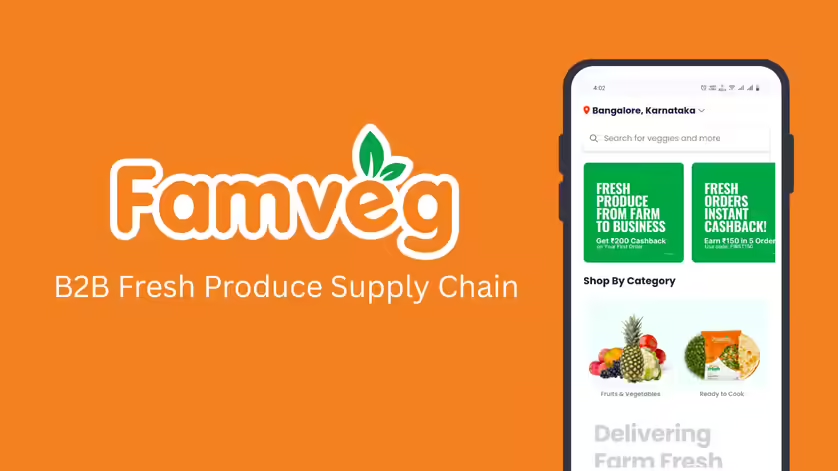In a world where nearly one-third of all food produced is wasted, innovative startups like Famveg are harnessing technology to tackle one of the most pressing issues in the food supply chain: fresh produce waste. By integrating AI, IoT, and data analytics, Famveg is creating a more efficient, transparent, and sustainable system for delivering fruits and vegetables from farms to consumers.
The startup addresses critical pain points in the perishable goods ecosystem, where inadequate demand forecasting, poor inventory management, and inefficient logistics contribute significantly to food loss. Famveg’s tech-driven approach not only reduces waste but also improves profitability for farmers, retailers, and distributors.

The Scale of the Problem: Food Waste in Numbers
Global Food Waste Crisis
- 1.3 billion tons of food is wasted annually worldwide
- Fresh produce accounts for nearly 45% of total food waste
- Economic losses exceed $1 trillion globally each year
- Environmental impact includes 8% of global greenhouse gas emissions
Indian Context
- India wastes ₹92,000 crore worth of food annually
- 30-40% of fresh produce deteriorates before reaching consumers
- Post-harvest losses particularly affect small and marginal farmers
How Famveg’s Technology Reduces Waste
1. AI-Powered Demand Forecasting
Famveg uses machine learning algorithms to analyze:
- Historical sales data
- Seasonal consumption patterns
- Weather conditions
- Local events and holidays
- Real-time market trends
Impact: Reduces overstocking and understocking by predicting demand with 90%+ accuracy.
2. Smart Inventory Management
- IoT sensors monitor temperature, humidity, and freshness of produce
- First-Expired-First-Out (FEFO) system prioritizes nearing-expiry items
- Automated replenishment triggers based on real-time stock levels
Impact: Extends shelf life and reduces spoilage by 30-40%.
3. Dynamic Routing and Logistics
- Route optimization algorithms minimize transportation time
- Real-time traffic and weather updates ensure timely deliveries
- Multi-stop load planning maximizes vehicle capacity utilization
Impact: Cuts transportation-related spoilage by 25%.
4. Digital Marketplace Platform
- Connects farmers directly with retailers and consumers
- Real-time pricing based on supply-demand dynamics
- Surplus produce auctions for items nearing expiry
Impact: Reduces intermediary layers and associated handling losses.
Key Features of Famveg’s Platform
For Farmers
- Digital cataloging of available produce
- Price discovery based on quality and freshness metrics
- Direct buyer connections eliminating middlemen
- Payment guarantee through escrow services
For Retailers and Restaurants
- Quality-graded produce with freshness guarantees
- Flexible ordering with same-day delivery options
- Transparent pricing without hidden costs
- Waste analytics to optimize purchasing decisions
For Consumers
- Freshness-guaranteed produce delivery
- Transparent sourcing from verified farms
- Subscription models for regular needs
- Recipe suggestions for using soon-to-expire items
Technology Stack and Innovation
Core Technologies
- Artificial Intelligence & Machine Learning
- Predictive analytics for demand forecasting
- Computer vision for quality assessment
- Natural language processing for customer service
- Internet of Things (IoT)
- Smart crates with environmental sensors
- Fleet tracking devices
- Warehouse monitoring systems
- Blockchain
- Supply chain transparency
- Quality verification
- Payment security
- Mobile and Cloud Platforms
- Real-time order management
- Supplier and buyer apps
- Analytics dashboards
Business Model and Revenue Streams
Primary Revenue Sources
- Transaction Fees
- Commission on each successful transaction
- Tiered pricing based on order value
- Subscription Services
- Premium features for businesses
- Consumer subscription boxes
- Data Analytics
- Insights and reports for stakeholders
- Market intelligence services
- Technology Licensing
- White-label solutions for large retailers
- API access for integration partners
Impact and Benefits
Environmental Impact
- Reduced carbon footprint from decreased food waste
- Optimized transportation lowering fuel consumption
- Sustainable farming practices through better price realization
Economic Benefits
- Higher incomes for farmers through direct market access
- Cost savings for retailers via reduced waste and better pricing
- Affordable quality produce for consumers
Social Value
- Food security improvement through efficient distribution
- Job creation in technology and logistics
- Consumer awareness about food waste reduction
Challenges and Solutions
Adoption Barriers
- Traditional Mindset: Farmers and retailers accustomed to conventional methods
- Digital Literacy: Varying levels of tech comfort among stakeholders
- Infrastructure Gaps: Limited cold chain facilities in rural areas
Famveg’s Approach
- Simple, intuitive interfaces designed for low-digital literacy users
- Offline capabilities for areas with poor connectivity
- Partnerships with existing aggregators and cooperatives
- Training programs for farmers and small retailers
Future Roadmap
Short-term Goals (2025-2026)
- Expand to 10 new cities across India
- Onboard 5,000+ farmers and 1,000+ retailers
- Launch mobile app in 5 regional languages
- Integrate UPI and digital payment options
Medium-term Vision (2027-2028)
- Develop proprietary IoT hardware for quality monitoring
- Establish micro-fulfillment centers in tier-2 cities
- Launch B2C subscription service in metropolitan areas
- Expand to Southeast Asian markets
Long-term Ambition (2029+)
- Become leading food waste reduction platform in Asia
- Develop AI-powered farming advisory services
- Create closed-loop system for organic waste recycling
- Impact 1 million+ farmers and reduce food waste by 50%
Competitive Landscape
Direct Competitors
- Ninjacart: B2B agricultural supply chain platform
- WayCool: Food supply chain company focusing on waste reduction
- DeHaat: Full-stack agricultural platform serving farmers
Famveg’s Differentiation
- Exclusive focus on waste reduction technology
- Proprietary freshness prediction algorithms
- Integrated farmer-to-consumer marketplace
- Strong emphasis on sustainability metrics
Conclusion: Transforming Food Systems Through Technology
Famveg represents a new generation of agritech startups that are leveraging technology not just for business efficiency, but for solving fundamental societal challenges. By addressing the root causes of food waste in the fresh produce supply chain, the company is creating value for all stakeholders while contributing to environmental sustainability.
As consumers become more conscious about food waste and sustainability, and as technology continues to evolve, solutions like Famveg’s have the potential to transform how we produce, distribute, and consume food. The startup’s success could pave the way for a more efficient, transparent, and sustainable global food system—one where technology ensures that the food we grow actually reaches the people who need it.

